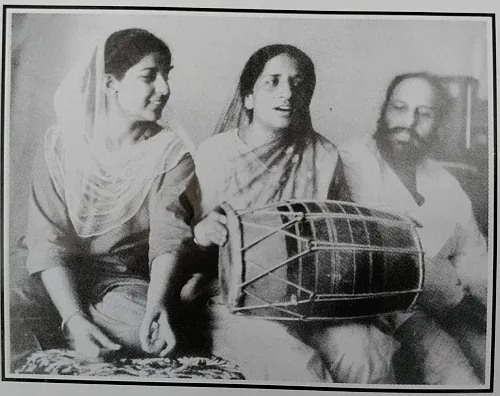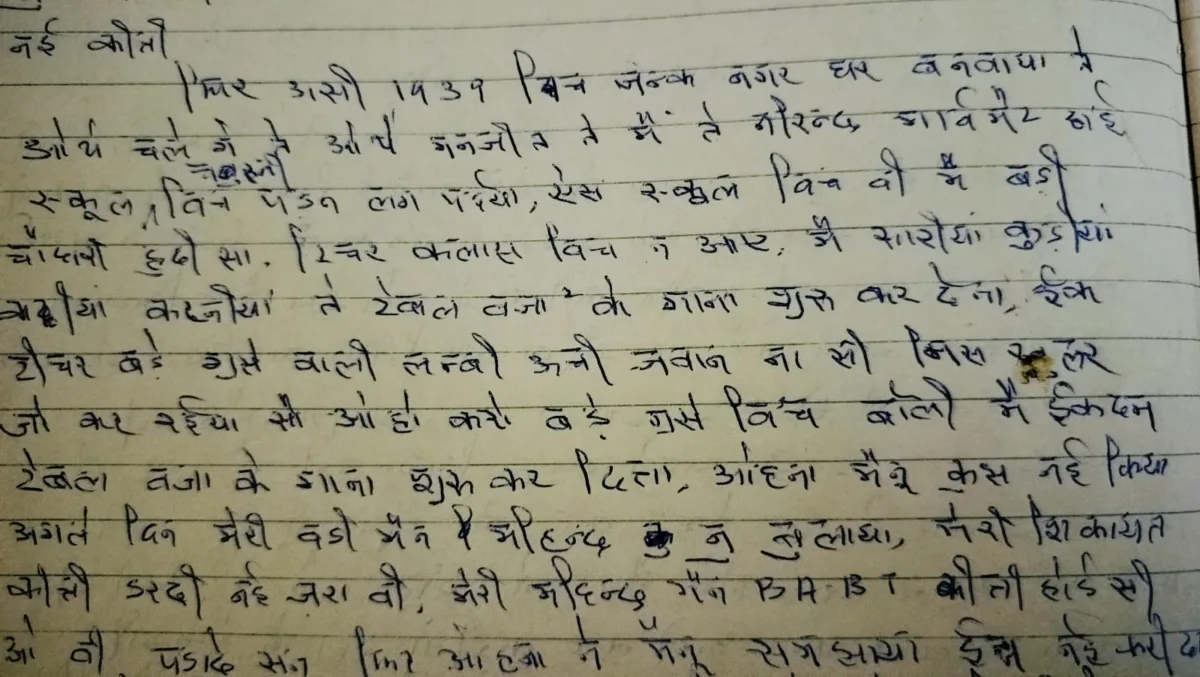DND Report:
Surinder Kaur, the voice of Punjabi mothers departed the mortal world at the age of 77 on June 14, 2006, leaving behind the legacy of singing and music that can still be seen in her fourth generation as her great-granddaughter Rhea is now bearing the flag and marching towards success of her career in singing and music. Born and raised in Lahore, Surinder Kaur could not take Lahore out of her life till her death, and memories of Lahore had always lived with her.

Though she died in 2006 but her soul was empty and sorrowful since the death of his lover, mentor, teacher, and husband, Professor Joginder Singh Sodhi, who died in 1976 when the couple was still in their 40s and was raising three young daughters. Sodhi was everything for her, and their 28 year of marriage was a tale of an eternal love affair where Sodhi was present everywhere as her support system. Imagine what could be a disastrous moment when he left her alone with three daughters?
“No Punjabi wedding all over the world is complete without the songs immortalized by Surinder Kaur”
Her remaining 30 years’ life without her husband were sorrowful, and that sorrow could be felt in her singing as well as in her eyes. An ever-smiling, witty, jolly, and full-of-life Surinder Kaur spent the rest of her life with the memories of her husband and the 12,000 books he left behind in a rented house. For months, Surinder did not reconcile with reality and used to tell her daughters that Darji (her husband) would come back soon. What an agony of an over-protected wife who used to leave all responsibilities to her caring husband, when she had been ruling the performing stages globally. Darji used to write lyrics for her, choose the best ideas and content of Punjabi literature, and even create tunes for her songs. Darji used to cook the best of the best food of her choice when she was out for a performance, and she knew that she would go home and Darji would offer her the mouthwatering food she had desired to eat before departing for a performance. This lioness of the stage lost everything with the death of her lion. Life was hard after 1976 for Surinder because she had to face more disasters like the deaths of her eldest sister and first teacher in music, Parkash Kaur, and then another sister who used to sing duets with her died due to cancer.
In December 1977, Surinder Kaur bought her house with the amount the University gave her after the death of her professor husband. It was near Model Town, Delhi, where she lived with her daughters until this area came under unplanned construction of the Delhi Metro Rail Project. The original Delhi Master Plan was changed to accommodate this new project, and residential areas that had been legal for decades came under this diversion from the Master Plan. The government decided to demolish certain residential areas to lay the track, and Surinder Kaur’s home was marked for demolition. However, through a legal fight, this part of Mall Road was taken out of the demolition plan, but the whole scene made her scared about the fate of her only shelter. Therefore, she decided to sell this house and started living with her eldest daughter, Dolly.
Surinder Kaur: The Voice of Punjabi Mothers
Surinder Kaur’s duet with her elder sister Prakash Kaur (Born on 19 September 1919, died on 2 November 1982) “Mavan te dhiya ral biathya ni maye”, recorded in the All India Radio Lahore Station, is an eternal piece of Punjabi music, singing, and literature. There is no doubt that no Punjabi wedding all over the world is complete without the songs immortalized by late Surinder Kaur and her sister Prakash Kaur, however, Surinder Kaur became the voice of every Punjabi mother because she dedicated her life along with her husband to document oral history of Punjab that was present in remote villages of Punjab in the form of prose and poetry.
“Surinder Kaur reintroduced the Punjabi language to Punjabi youth”
Born in Lahore on November 25, 1929, Surinder was raised with her four sisters and five brothers at Bashan Street Chuburji Lahore. Her father was a chemistry professor at Government College Lahore. Surinder Kaur was an urban Punjabi girl from Lahnda, Punjab (West Punjab) who was raised in a well-educated family in Lahore city but contributed her whole life to documenting and saving classical Punjabi language and collective Punjabi consciousness through her songs. Surinder Kaur wrote some of her memories when she was living abroad with her daughter.

According to these memories, she spent the early years of her education in Victoria School, Lahore, which is now known as Victoria High School. She added that in 1939, she moved to Arya Nagar Girls High School in Lahore. She did her matriculation at Arya Nagar Girls High School, Lahore, which was an English Medium School and was in the vicinity of Choburji Garden. The school was established in the same year (1929) when Surinder Kaur was born. Having a total area of 14 Kanal of land, 10 Kanal was an open area (grounds), and the building was spread over four Kanal in 1929. The school was renamed after the division of the Indo-subcontinent as “Govt Girls High School Choburji Garden Lahore”.
“Her greatest contribution is the documentation of anthropological aspects and oral wisdom of Punjabi culture through her songs.”
After the division of the Indo-subcontinent in 1947, Surinder Kaur and her parents relocated to Ghaziabad, Delhi. She was married to Prof. Joginder Singh Sodhi, who was born and raised in Gujranwala. Spotting her surprising talent, Prof. Joginder Singh Sodhi became her support system, and soon she started a career as a playback singer in the Hindi film industry in Bombay, introduced by music director Ghulam Haider. She got an extraordinary response for her Hindi and Urdu songs in the 1948 film Shaheed, including “Badnam Na Ho Jaye Mohabbat Ka Fasaana”, “Aanaa hai tu aajaao” and “Taqdeer ki aandhi”, and “Hum kahaan aur thum kahaan”. However, her soul was connected with Punjab and Punjabi, and she eventually moved back to Delhi in 1952 and dedicated her life to reviving Punjabi songs. Got fame from singing Hindi and Urdu songs, Surinder Kaur decided to switch to Punjabi when she was the most popular voice of Urdu and Hindi songs. The force behind her decision was to preserve, promote, and document the Punjabi language. She thought that the Punjabi language was losing its social status and classical diction was vanishing from songs and literature. Her contribution to the Punjabi language is yet to be documented properly. Her biggest sacrifice for the Punjabi language was that she left singing Urdu and Hindi songs and dedicated herself to Punjabi songs at a time when she was a shining star of the Urdu and Hindi songs industry. At a very young age, her voice became the most popular while singing with names like Syria, Muhammad Rafi, Lata Mangeshkar, and Talat Mahmood.
Dedicating Life to the Revival of Punjabi songs
As a singer and songwriter who sang over 2,000 Punjabi songs, Surinder Kaur reintroduced the Punjabi language to Punjabi youth living abroad, particularly in North America and the United Kingdom. The generation that was born and brought abroad had social difficulties in learning Punjabi as their first language. The constant music trips of Surinder Kaur and her performances in Canada and the United Kingdom helped Punjabi youth living there to get connected with the Punjabi language. Surinder Kaur dedicated her life to documenting and preserving the Punjabi language and culture, and showed the world that the Punjabi language is so rich that it can survive even out of the genre of “folk singing”. Her commitment and dedication to her language paved the way for future generations to choose the Punjabi language as a medium of expression in music and films. If Surinder Kaur had not sung contemporary music, today’s Punjabi music and film industry would have believed that Punjabi was only for folk art forms.
Surinder Kaur, who was an urban Punjabi girl hailing from an educated family born and raised in Lahore (which was the biggest urban area of the then undivided Punjab), would not be forgotten for the greatest contribution to documenting anthropological aspects and oral wisdom of Punjabi culture through her songs.
Surinder Kaur left the mortal world in 2006, but she would never die because her huge work will keep her alive in the hearts of all Punjabis living in every corner of the world.
“Bulleh Shah Asan Marna Nahi, Gor Paya Koi Hor”
(It is not me in the grave, it is someone else.)
